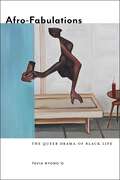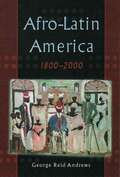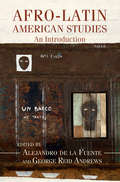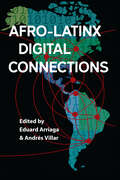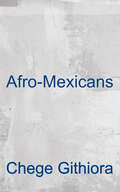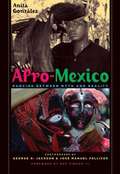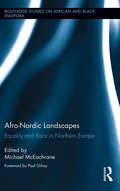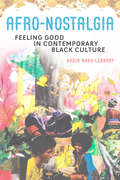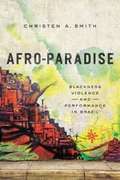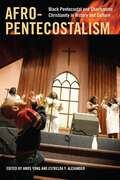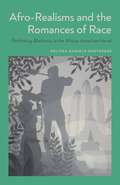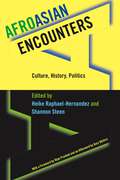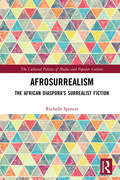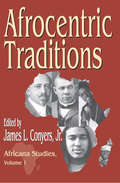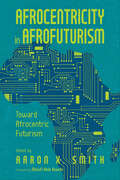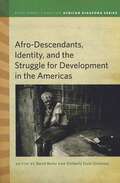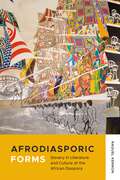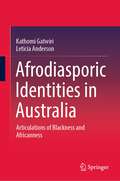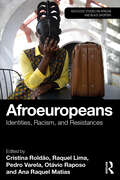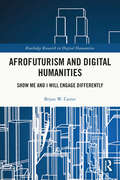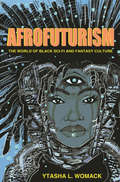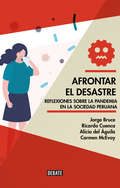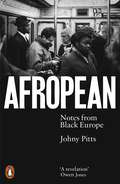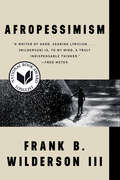- Table View
- List View
Afro-Fabulations: The Queer Drama of Black Life (Sexual Cultures #14)
by Tavia Nyong'oWinner, 2019 Barnard Hewitt Award for Outstanding Research in Theatre History, given by the American Society for Theatre ResearchHonorable Mention, 2021 Errol Hill Award, given by the American Society for Theatre ResearchArgues for a conception of black cultural life that exceeds post-blackness and conditions of loss In Afro-Fabulations: The Queer Drama of Black Life, cultural critic and historian Tavia Nyong’o surveys the conditions of contemporary black artistic production in the era of post-blackness. Moving fluidly between the insurgent art of the 1960’s and the intersectional activism of the present day, Afro-Fabulations challenges genealogies of blackness that ignore its creative capacity to exceed conditions of traumatic loss, social death, and archival erasure.If black survival in an anti-black world often feels like a race against time, Afro-Fabulations looks to the modes of memory and imagination through which a queer and black polytemporality is invented and sustained. Moving past the antirelational debates in queer theory, Nyong’o posits queerness as “angular sociality,” drawing upon queer of color critique in order to name the gate and rhythm of black social life as it moves in and out of step with itself. He takes up a broad range of sites of analysis, from speculative fiction to performance art, from artificial intelligence to Blaxploitation cinema. Reading the archive of violence and trauma against the grain, Afro-Fabulations summons the poetic powers of queer world-making that have always been immanent to the fight and play of black life.
Afro-Latin America, 1800-2000
by George Reid AndrewsWhile the rise and abolition of slavery and ongoing race relations are central themes of the history of the United States, the African diaspora actually had a far greater impact on Latin and Central America. More than ten times as many Africans came to Spanish and Portuguese America as the United States. <p><p>In this, the first history of the African diaspora in Latin America from emancipation to the present, George Reid Andrews deftly synthesizes the history of people of African descent in every Latin American country from Mexico and the Caribbean to Argentina. He examines how African peooples and their descendants made their way from slavery to freedom and how they helped shape and responded to political, economic, and cultural changes in their societies. Individually and collectively they pursued the goals of freedom, equality, and citizenship through military service, political parties, civic organizations, labor unions, religious activity, and other avenues. <p><p>Spanning two centuries, this tour de force should be read by anyone interested in Latin American history, the history of slavery, and the African diaspora, as well as the future of Latin America.
Afro-Latin American Studies: An Introduction (Afro-latin America )
by George Reid Andrews Alejandro De La FuenteAlejandro de la Fuente and George Reid Andrews offer the first systematic, book-length survey of humanities and social science scholarship on the exciting field of Afro-Latin American studies. Organized by topic, these essays synthesize and present the current state of knowledge on a broad variety of topics, including Afro-Latin American music, religions, literature, art history, political thought, social movements, legal history, environmental history, and ideologies of racial inclusion.<P><P> This volume connects the region's long history of slavery to the major political, social, cultural, and economic developments of the last two centuries. Written by leading scholars in each of those topics, the volume provides an introduction to the field of Afro-Latin American studies that is not available from any other source and reflects the disciplinary and thematic richness of this emerging field.<P> Presents systematic and synthetic overviews of recent scholarship on topics of major importance in the field of Afro-Latin American studies, for example Afro-Latin American religions, Afro-Latin American political movements, and Afro-Latin American music. Covers a broad range of topics, embracing most of the humanities and social sciences.<P> Serves as the authoritative introduction for Afro-Latin American history, covering the period from 1500 to the present.<P>
Afro-Latinx Digital Connections (Reframing Media, Technology, and Culture in Latin/o America)
by Eduard Arriaga Andrés VillarHow Black Latinx communities are using digital technology to achieve visibility and social justice This volume presents examples of how digital technologies are being used by people of African descent in South America and the Caribbean, a topic that has been overlooked within the field of digital humanities. These case studies show that in the last few decades, Black Latinx communities have been making themselves visible and asserting long-standing claims and rights through digital tools and platforms, which have been essential for enacting discussions and creating new connections between diverse groups. Afro-Latinx Digital Connections includes both research articles and interviews with practitioners who are working to create opportunities for marginalized communities. Projects discussed in this volume range from an Afrodescendant digital archive in Argentina, blog networks in Cuba, an NGO dedicated to democratizing technology in Brazilian favelas, and the recruitment of digital media to fight racism in Peru. Contributors demonstrate that these tools need not be state of the art to be effective and that they are often most useful when employed to sustain a resilience that is deep and historically grounded. Digital connections are shown here as a means to achieve social justice and to create complex self-representations that challenge racist images of Afrodescendant peoples and monolithic conceptions of humanity. This volume expands the scope of digital humanities and challenges views of the field as a predominantly white discipline. Contributors: Sandra AbdAllah-Álvarez | Adebayo Adegbembo | Maya Anderson-González | Eduard Arriaga | Silvana Bahia | Yvonne Captain | Monica Carrillo | Yancy Castillo | Alí Majul | Maria Cecilia Martino | Andrés Villar A volume in the series Reframing Media, Technology, and Culture in Latin/o America, edited by Héctor Fernández L’Hoeste and Juan Carlos Rodríguez
Afro-Mexicans: Discourse of Race and Identity on the African Diaspora
by Chege GithoriaMy fascinating journey among Afro-Mexicans began when I was a student in Mexico City. My personal background had shaped in me a consciousness about African people dispersed in all continents, but because of the language barrier, my conceptualization of their journey of migration and survival, linguistic and sociocultural continuities was limited to African Diaspora experiences of Anglo-North America and the Caribbean, perhaps one or two translations from the French Caribbean experience, but nothing of the Hispanic Diaspora. This pervasive effect of the linguistic spheres carved by the different European powers in their colonization of Africa, Asia, and the Americas must, I con¬cluded, be appreciated in full.
Afro-Mexico: Dancing Between Myth and Reality
by Anita GonzálezWhile Africans and their descendants have lived in Mexico for centuries, many Afro-Mexicans do not consider themselves to be either black or African. For almost a century, Mexico has promoted an ideal of its citizens as having a combination of indigenous and European ancestry. This obscures the presence of African, Asian, and other populations that have contributed to the growth of the nation. However, performance studies--of dance, music, and theatrical events--reveal the influence of African people and their cultural productions on Mexican society. In this work, Anita Gonzalez articulates African ethnicity and artistry within the broader panorama of Mexican culture by featuring dance events that are performed either by Afro-Mexicans or by other ethnic Mexican groups about Afro-Mexicans. She illustrates how dance reflects upon social histories and relationships and documents how residents of some sectors of Mexico construct their histories through performance. Festival dances and, sometimes, professional staged dances point to a continuing negotiation among Native American, Spanish, African, and other ethnic identities within the evolving nation of Mexico. These performances embody the mobile histories of ethnic encounters because each dance includes a spectrum of characters based upon local situations and historical memories.
Afro-Nordic Landscapes: Equality and Race in Northern Europe (Routledge Studies on African and Black Diaspora)
by Michael McEachraneAfro-Nordic Landscapes: Equality and Race in Northern Europe challenges a view of Nordic societies as homogenously white, and as human rights champions that are so progressive that even the concept of race is deemed irrelevant to their societies. The book places African Diasporas, race and legacies of imperialism squarely in a Nordic context. How has a nation as peripheral as Iceland been shaped by an identity of being white? How do Black Norwegians challenge racially conscribed views of Norwegian nationhood? What does the history of jazz in Denmark say about the relation between its national identity and race? What is it like to be a mixed-race black Swedish woman? How have African Diasporans in Finland navigated issues of race and belonging? And what does the widespread denial of everyday racism in Nordic societies mean to Afro-Nordics? This text is a must read for anyone interested in issues of race in the Nordic region and Europe writ large. As Paul Gilroy writes in his foreword, it is a book that "should be studied with care and profit inside the Nordic countries and also outside them by the broader international readership that has been established around the study of racism and 'critical race theory'."
Afro-Nostalgia: Feeling Good in Contemporary Black Culture (New Black Studies Series #1)
by Badia Ahad-LegardyThe past as a building block of a more affirming and hopeful future As early as the eighteenth century, white Americans and Europeans believed that people of African descent could not experience nostalgia. As a result, black lives have been predominately narrated through historical scenes of slavery and oppression. This phenomenon created a missing archive of romantic historical memories. Badia Ahad-Legardy mines literature, visual culture, performance, and culinary arts to form an archive of black historical joy for use by the African-descended. Her analysis reveals how contemporary black artists find more than trauma and subjugation within the historical past. Drawing on contemporary African American culture and recent psychological studies, Ahad-Legardy reveals nostalgia’s capacity to produce positive emotions. Afro-nostalgia emerges as an expression of black romantic recollection that creates and inspires good feelings even within our darkest moments. Original and provocative, Afro-Nostalgia offers black historical pleasure as a remedy to contend with the disillusionment of the present and the traumas of the past.
Afro-Paradise: Blackness, Violence, and Performance in Brazil
by Christen A SmithTourists exult in Bahia, Brazil as a tropical paradise infused with the black population's one-of-a-kind vitality. But the alluring images of smiling black faces and dancing black bodies masks an ugly reality of anti-black authoritarian violence. Christen A. Smith argues that the dialectic of glorified representations of black bodies and subsequent state repression reinforces Brazil's racially hierarchal society. Interpreting the violence as both institutional and performative, Smith follows a grassroots movement and social protest theater troupe in their campaigns against racial violence. As Smith reveals, economies of black pain and suffering form the backdrop for the staged, scripted, and choreographed afro-paradise that dazzles visitors. The work of grassroots organizers exposes this relationship, exploding illusions and asking unwelcome questions about the impact of state violence performed against the still-marginalized mass of Afro-Brazilians.
Afro-Pentecostalism: Black Pentecostal and Charismatic Christianity in History and Culture (Religion, Race, and Ethnicity #16)
by Amos Yong Estrelda Y AlexanderThis &“well researched, illuminating, and highly informative" volume presents a comprehensive, scholarly overview of Black Pentecostal and Charismatic Christianity (Choice). Since the American Pentecostal movement began in the early twentieth century, its African American sector has been markedly influential. Black Christians have been integrally involved in every aspect of the Pentecostal movement, making significant contributions to its founding as well as the evolution of Pentecostal/charismatic styles of worship, preaching, music, engagement of social issues, and theology. Yet despite its being one of the fastest growing segments of the Black Church, Afro-Pentecostalism has not received the kind of critical attention it deserves. Afro-Pentecostalism brings together fourteen interdisciplinary scholars to examine different facets of the movement, including its early history, issues of gender, relations with other black denominations, intersections with popular culture, and missionary activities, as well as the movement&’s distinctive theology. Bolstered by editorial introductions to each section, the chapters reflect on the state of the movement, chart its trajectories, discuss pertinent issues, and anticipate future developments. Contributors: Estrelda Y. Alexander, Valerie C. Cooper, David D. Daniels III, Louis B. Gallien, Jr., Clarence E. Hardy III, Dale T. Irvin, Ogbu U. Kalu, Leonard Lovett, Cecil M. Robeck, Jr., Cheryl J. Sanders, Craig Scandrett-Leatherman, William C. Turner, Jr., Frederick L. Ware, and Amos Yong
Afro-Realisms and the Romances of Race: Rethinking Blackness in the African American Novel
by Melissa Daniels-RauterkusFrom the 1880s to the early 1900s, a particularly turbulent period of U.S. race relations, the African American novel provided a powerful counternarrative to dominant and pejorative ideas about blackness. In Afro-Realisms and the Romances of Race, Melissa Daniels-Rauterkus uncovers how black and white writers experimented with innovative narrative strategies to revise static and stereotypical views of black identity and experience. In this provocative and challenging book, Daniels-Rauterkus contests the long-standing idea that African Americans did not write literary realism, along with the inverse misconception that white writers did not make important contributions to African American literature. Taking up key works by Charles W. Chesnutt, Frances E. W. Harper, Pauline Hopkins, William Dean Howells, and Mark Twain, Daniels-Rauterkus argues that authors blended realism with romance, often merging mimetic and melodramatic conventions to advocate on behalf of African Americans, challenge popular theories of racial identity, disrupt the expectations of the literary marketplace, and widen the possibilities for black representation in fiction. Combining literary history with close textual analysis, Daniels-Rauterkus reads black and white writers alongside each other to demonstrate the reciprocal nature of literary production. Moving beyond discourses of racial authenticity and cultural property, Daniels-Rauterkus stresses the need to organize African American literature around black writers and their meditations on blackness, but she also proposes leaving space for nonblack writers whose use of comparable narrative strategies can facilitate reconsiderations of the complex social order that constitutes race in America. With Afro-Realisms and the Romances of Race, Daniels-Rauterkus expands critical understandings of American literary realism and African American literature by destabilizing the rigid binaries that too often define discussions of race, genre, and periodization.
Afro-Sweden: Becoming Black in a Color-Blind Country
by Ryan Thomas SkinnerA compelling examination of Sweden&’s African and Black diasporaContemporary Sweden is a country with a worldwide progressive reputation, despite an undeniable tradition of racism within its borders. In the face of this contradiction of culture and history, Afro-Swedes have emerged as a vibrant demographic presence, from generations of diasporic movement, migration, and homemaking. In Afro-Sweden, Ryan Thomas Skinner uses oral histories, archival research, ethnography, and textual analysis to explore the history and culture of this diverse and growing Afro-European community.Skinner employs the conceptual themes of &“remembering&” and &“renaissance&” to illuminate the history and culture of the Afro-Swedish community, drawing on the rich theoretical traditions of the African and Black diaspora. Remembering fosters a sustained meditation on Afro-Swedish social history, while Renaissance indexes a thriving Afro-Swedish public culture. Together, these concepts illuminate significant existential modes of Afro-Swedish being and becoming, invested in and contributing to the work of global Black studies.The first scholarly monograph in English to focus specifically on the African and Black diaspora in Sweden, Afro-Sweden emphasizes the voices, experiences, practices, knowledge, and ideas of these communities. Its rigorously interdisciplinary approach to understanding diasporic communities is essential to contemporary conversations around such issues as the status and identity of racialized populations in Europe and the international impact of Black Lives Matter.
AfroAsian Encounters: Culture, History, Politics
by Paul SemoninWith a Foreword by Vijay Prashad and an Afterword by Gary OkihiroHow might we understand yellowface performances by African Americans in 1930s swing adaptations of Gilbert and Sullivan's The Mikado, Paul Robeson's support of Asian and Asian American struggles, or the absorption of hip hop by Asian American youth culture?AfroAsian Encounters is the first anthology to look at the mutual influence of and relationships between members of the African and Asian diasporas. While these two groups have often been thought of as occupying incommensurate, if not opposing, cultural and political positions, scholars from history, literature, media, and the visual arts here trace their interconnections and interactions, as well as the tensions between the two groups that sometimes arise. AfroAsian Encounters probes beyond popular culture to trace the historical lineage of these coalitions from the late nineteenth century to the present.A foreword by Vijay Prashad sets the volume in the context of the Bandung conference half a century ago, and an afterword by Gary Okihiro charts the contours of a “Black Pacific.” From the history of Japanese jazz composers to the current popularity of black/Asian “buddy films” like Rush Hour, AfroAsian Encounters is a groundbreaking intervention into studies of race and ethnicity and a crucial look at the shifting meaning of race in the twenty-first century.
AfroSurrealism: The African Diaspora's Surrealist Fiction (The Cultural Politics of Media and Popular Culture)
by Rochelle SpencerExamining the surrealist novels of several contemporary writers including Edwidge Danticat, Tananarive Due, Nalo Hopkinson, Junot Díaz, Helen Oyeyemi, and Colson Whitehead, AfroSurrealism, the first book-length exploration of AfroSurreal fiction, argues that we have entered a new and exciting era of the black novel, one that is more invested than ever before in the cross sections of science, technology, history, folklore, and myth. Building on traditional surrealist scholarship and black studies criticism, the author contends that as technology has become ubiquitous, the ways in which writers write has changed; writers are producing more surrealist texts to represent the psychological challenges that have arisen during an era of rapid social and technological transitions. For black writers, this has meant not only a return to Surrealism, but also a complete restructuring in the way that both past and present are conceived, as technology, rather than being a means for demeaning and brutalizing a black labor force, has become an empowering means of sharing information. Presenting analyses of contemporary AfroSurreal fiction, this volume examines the ways in which contemporary writers grapple with the psychology underlying this futuristic technology, presenting a cautiously optimistic view of the future, together with a hope for better understanding of the past. As such, it will appeal to scholars of cultural, media and literary studies with interests in the contemporary novel, Surrealism, and black fiction.
Afrocentric Traditions
by James L. Conyers Jr.Ever since the first contacts between Europe and Africa, African people have operated from the fringes of Eurocentric experience in the Western mind. Much of what we have studied in African history and culture, or literature and linguistics, or politics and economics, has been orchestrated from the standpoint of Europe's interests. Whether it is a matter of economics, history, politics, geographical concepts, or art, Africans have been seen as peripheral. This volume reviews the past in order to evaluate the present and move ahead with appropriate policies for the future. The articles in this volume, the first in a new serial publication in Africana studies, cover a broad range of subject matter and methodology. Topics range from the W.E.B. DuBois-Booker T. Washington schism that led to the formation of the Niagara movement, to the popular dissemination of black hip-hop culture. It opens with a description of Afrocentricity by Molefi K. Asante. Kobi K.K. Kambon and Reginald Rackley discuss the construct, that produces European cultural "misidentification" among Africans. Nell Irvin Painter, in discussing the Shoah and Southern history, parallels the rhetoric of hate that permeated the late nineteenth- and early twentieth-century German diatribes against Jews with that of the Southern white supremacists against blacks. Anthony B. Pinn notes similarities that tie together slavery and colonialism in a bond of existential and ontological destruction. Anthony J. Lemelle, Jr., examines critical issues about black masculinity. James B. Stewart elaborates on the development of Africana studies. Julius E. Thompson explores the historical importance of the African-American writer in Mississippi history. Cary DeCordova Wintz the basis of the conflict between W.E.B. DuBois and Booker T. Washington in an effort to expose its underlying causes. James L. Conyers, Jr. summarizes social and cultural movements, in particular the popular black hip-hop culture. Rounding out the pres
Afrocentricity in AfroFuturism: Toward Afrocentric Futurism
by Aaron X. SmithContributions by Taharka Adé, Molefi Kete Asante, Alonge O. Clarkson, John P. Craig, Ifetayo M. Flannery, Kofi Kubatanna, Lehasa Moloi, M. Ndiika Mutere, and Aaron X. SmithIn the twenty-first century, AfroFuturism—a historical and philosophical concept of the future imagined through a Black cultural lens—has been interpreted through a myriad of writers, artists, scientists, and other visionary creatives. In Afrocentricity in AfroFuturism: Toward Afrocentric Futurism, editor Aaron X. Smith curates a collection of interdisciplinary essays that critiques existing scholarship on Black futurity. In contrast to much previous work, these essays ground their explorations in African agency, centering the African within historical and cultural reality. Situating Afrocentricity as the field’s foundational root and springboard for an expansive future, contributors detail potential new modes of existence and expression for African people throughout the diaspora.Divided into two parts—Representations and Transformations—this book examines the tensions created by historical and cultural dislocation of African peoples and consciousness. Contributors cover varied topics such as the intersections of culture and design; techno culture; neuroscience; and the multiplicity of African cultural influences in aesthetics, oratory, visual art, hip hop, and more. Essays range from theoretical analyses to close readings of history and popular culture, from the Haitian Revolution to Sun Ra, Janelle Monáe’s Dirty Computer, and Black Panther. Afrocentricity in AfroFuturism offers an expansive vision of AfroFuturism and its ranging significance to contemporary culture and discourse.
Afrodescendants, Identity, And The Struggle For Development In The Americas (Ruth Simms Hamilton African Diaspora Ser.)
by Bernd Reiter Kimberly Eison SimmonsIndigenous people and African descendants in Latin America and the Caribbean have long been affected by a social hierarchy established by elites, through which some groups were racialized and others were normalized. Far from being 'racial paradises' populated by an amalgamated 'cosmic race' of mulattos and mestizos, Latin America and the Caribbean have long been sites of shifting exploitative strategies and ideologies, ranging from scientific racism and eugenics to the more sophisticated official denial of racism and ethnic difference. This book, among the first to focus on African descendants in the region, brings together diverse reflections from scholars, activists, and funding agency representatives working to end racism and promote human rights in the Americas. By focusing on the ways racism inhibits agency among African descendants and the ways African-descendant groups position themselves in order to overcome obstacles, this interdisciplinary book provides a multi-faceted analysis of one of the gravest contemporary problems in the Americas.
Afrodiasporic Forms: Slavery in Literature and Culture of the African Diaspora
by Raquel KennonAfrodiasporic Forms explores the epistemological possibilities of the “Black world” paradigm and traces a literary and cultural cartography of the monde noir and its constitutive African diasporas across multiple poetic, visual, and cultural permutations. Examining the transatlantic slave trade and modern racial slavery, Raquel Kennon challenges the US-centric focus of slavery studies and draws on a transnational, eclectic archive of materials from Lusophone, Hispanophone, and Anglophone sources in the Americas to inspect evolving, multitudinous, and disparate forms of Afrodiasporic cultural expression.Spanning the 1830s to the twenty-first century, Afrodiasporic Forms traverses national, linguistic, and disciplinary boundaries as it investigates how cultural products of slavery’s afterlife—including poetry, prose, painting, television, sculpture, and song—shape understandings of the African diaspora. Each chapter uncovers multidirectional pathways for exploring representations of slavery, considering works such as a Brazilian telenovela based on Bernardo Guimarães’s novel A Escrava Isaura, Robert Hayden’s poem “Middle Passage,” Kara Walker’s sculpture A Subtlety, and Juan Francisco Manzano’s Autobiografía de un esclavo. Kennon’s expansive method of comparative reading across the diaspora uses eclectic pairings of canonical and popular textual and artistic sources to stretch beyond disciplinary and national borders, promoting expansive diasporic literacies.
Afrodiasporic Identities in Australia: Articulations of Blackness and Africanness
by Kathomi Gatwiri Leticia AndersonThis book explores the Afro-diasporic experiences of African skilled migrants in Australia. It explores research participants' experiences of migration and how these experiences inform their lives and the lives of their family. It provides theory-based arguments examining how mainstream immigration attitudes in Australia impact upon Black African migrants through the mediums of mediatised moral panics about Black criminality and acts of everyday racism that construct and enforce their 'strangerhood'. The book presents theoretical writing on alternate African diasporic experiences and identities and the changing nature of such identities. The qualitative study employed semi-structured interviews to investigate multiple aspects of the migrant experience including employment, parenting, family dynamics and overall sense of belonging. This book advances our understanding of the resilience exercised by skilled Black African migrants as they adjust to a new life in Australia, with particular implications for social work, public health and community development practices.
Afroeuropeans: Identities, Racism, and Resistances (Routledge Studies on African and Black Diaspora)
by Cristina Roldão Raquel Lima Pedro Varela Otávio Raposo Ana Raquel MatiasAfroeuropeans: Identities, Racism, and Resistances reflects on the tensions, ambiguities, and paradoxes of Blackness in Europe.The book addresses relations of domination and modes of racial exclusion, but also Afro-European interventions in the political, social, cultural, and artistic spheres, and the multiple resistances that have sustained Black bodies in the European continent. At the same time as Black histories, cultures, and social conditions are made invisible in hegemonic accounts in Europe, there is a hypervisibility and presence of Black stereotyping in European popular culture. Black identities have become even more conditioned by new mainstream far-right discourses and the tightening immigrant and refugee policies that affect people of African descent. One of the book’s most innovative contributions is the attention it gives to Black South European thought, experiences, and resistance—particularly in the Portuguese context. This constitutes not only a critique Europe’s pervasive racism and "color blindness" policies but also makes a significant contribution to a broader understanding of Blackness and racism, extending beyond the U.S. and Northern European contexts.This book is forged in a moment of particularly strong Black intellectual and political vitality. Given the book’s intersectional and transdisciplinary approach, it will be an important go-to for students and researchers across the humanities and social sciences, as well as to artists, activists, politicians, and journalists.
Afrofuturism and Digital Humanities: Show Me and I Will Engage Differently
by Bryan W. CarterThis book brings Afrofuturism into conversation with digital humanities to pioneer the field of Digital Africana Studies, and shows how students and academics can engage with the vision of Afrofuturism, both theoretically and practically, in the classroom and through research. As Black people across the globe consider their place in the future following the past two decades of technological advancement, Afrofuturism and its relevance for the humanities has become ever pertinent. While Afrofuturism has thus far been discussed through a literary, artistic, or popular culture lens, growing use of new technologies, and its resultant intersections with the reality of our racial experiences, has created a need for approaching Afrofuturism from a digital studies perspective. Via detailed case studies, Bryan W. Carter introduces the field of Digital Africana Studies to demonstrate how this new area can be experienced pedagogically. Alongside the book, readers can also visit select Digital Africana Studies projects that exemplify the various technologies and projects described at the author’s website: ibryancarter.com/projects. Given its unique approach to the path-breaking tradition of Afrofuturism, the book will be indispensable for scholars and students across fields such as digital humanities, media studies, black studies, African American studies, and Africana studies.
Afrofuturism: The World of Black Sci-Fi and Fantasy Culture
by Ytasha WomackComprising elements of the avant-garde, science fiction, cutting-edge hip-hop, black comix, and graphic novels, Afrofuturism spans both underground and mainstream pop culture. With a twofold aim to entertain and enlighten, Afrofuturists strive to break down racial, ethnic, and all social limitations to empower and free individuals to be themselves. This book introduces readers to the burgeoning artists creating Afrofuturist works, the history of innovators in the past, and the wide range of subjects they explore. From the sci-fi literature of Samuel Delany, Octavia Butler, and NK Jemisin to the musical cosmos of Sun Ra, George Clinton, and the Black Eyed Peas' will.i.am, to the visual and multimedia artists inspired by African Dogon myths and Egyptian deities, topics range from the "alien" experience of blacks in America to the "wake up" cry that peppers sci-fi literature, sermons, and activism. Interviews with rappers, composers, musicians, singers, authors, comic illustrators, painters, and DJs, as well as Afrofuturist professors, provide a firsthand look at this fascinating movement.
Afrontar el desastre: Reflexiones sobre la pandemia en la sociedad peruana
by JORGE BRUCE Carmen McEvoy RICARDO CUENCAUn e-book que analiza los comportamientos de los peruanos y peruanas en tiempos de pandemia Afrontar el desastre. Reflexiones sobre la pandemia en la sociedad peruana reúne cuatro textos para repensar los impactos y consecuencias del COVID-19 en la vida cotidiana de los peruanos y peruanas durante el encierro. Las restricciones y el confinamiento en el Perú han generado una sensación de incertidumbre sobre el futuro para muchos ciudadanos. En este contexto, los ensayos del psicoanalista Jorge Bruce, Ricardo Cuenca, director general e investigador del Instituto de Estudios Peruanos (IEP), la socióloga Alicia del Águila y la historiadora Carmen McEvoy, cuestionan la función de las instituciones estatales, la transgresión de las normas, la precariedad del sistema y los temores profundos que esta pandemia ha agudizado.
Afropean: Notes from Black Europe
by Johny PittsWinner of the Jhalak Prize'A revelation' Owen Jones'Afropean seizes the blur of contradictions that have obscured Europe's relationship with blackness and paints it into something new, confident and lyrical' Afua Hirsch A Guardian, New Statesman and BBC History Magazine Best Book of 2019 'Afropean. Here was a space where blackness was taking part in shaping European identity ... A continent of Algerian flea markets, Surinamese shamanism, German Reggae and Moorish castles. Yes, all this was part of Europe too ... With my brown skin and my British passport - still a ticket into mainland Europe at the time of writing - I set out in search of the Afropeans, on a cold October morning.'Afropean is an on-the-ground documentary of areas where Europeans of African descent are juggling their multiple allegiances and forging new identities. Here is an alternative map of the continent, taking the reader to places like Cova Da Moura, the Cape Verdean shantytown on the outskirts of Lisbon with its own underground economy, and Rinkeby, the area of Stockholm that is eighty per cent Muslim. Johny Pitts visits the former Patrice Lumumba University in Moscow, where West African students are still making the most of Cold War ties with the USSR, and Clichy Sous Bois in Paris, which gave birth to the 2005 riots, all the while presenting Afropeans as lead actors in their own story.
Afropessimism
by Frank B. Wilderson III“Wilderson’s thinking teaches us to believe in the miraculous even as we decry the brutalities out of which miracles emerge”—Fred Moten Praised as “a trenchant, funny, and unsparing work of memoir and philosophy” (Aaron Robertson,?Literary Hub), Frank B. Wilderson’s Afropessimism arrived at a moment when protests against police brutality once again swept the nation. Presenting an argument we can no longer ignore, Wilderson insists that we must view Blackness through the lens of perpetual slavery. Radical in conception, remarkably poignant, and with soaring flights of memoir, Afropessimism reverberates with wisdom and painful clarity in the fractured world we inhabit.“Wilderson’s ambitious book offers its readers two great gifts. First, it strives mightily to make its pessimistic vision plausible. . . . Second, the book depicts a remarkable life, lived with daring and sincerity.”—Paul C. Taylor, Washington Post
